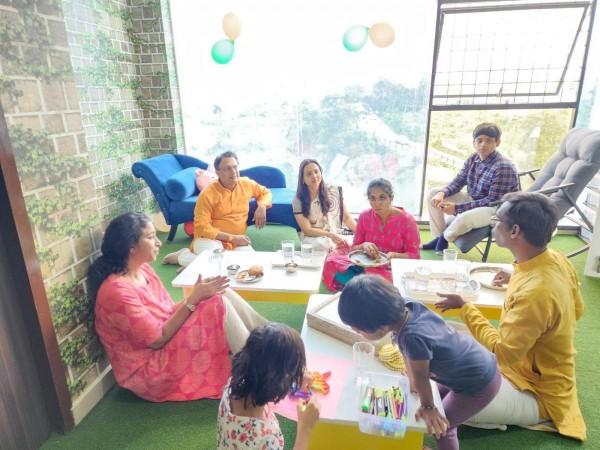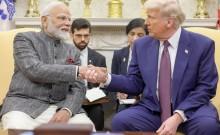Sai was ten years old when he earned his first payment for a task he had undertaken for an
overseas client. It was for editing a video content. He undertook the job after having learnt
the software of an app, all on his own.
His parents had taken him off regular school when he was nine. Today the 13-year-old has gone on
to help his parents with video editing for their engineering consultancy and training academy.
Besides, he also helps them in the recruitment process of video editors for their organisation.
Yes, you read that right. The teenager has learnt it all on his own.
Sai is no nerd either. He recently took part in his first karate tournament and won the gold
medal in the beginners' category and is headed to Dubai for the next.
Is he a whizzkid -- one of the smart children one reads about, who can set the Rubiks cube at
peace in a few deft moves, or tackle the Fibonacci series? Perhaps Sai, if he sets his mind, can
do all that. But for now, he is happy in the field he has chosen to learn a few tricks in. He has the space to experiment. He has the time. He has freedom.
He does not have any pressure. He has no strict deadlines. He is not told what is to be done.
That in short has made the difference for Sai. It can be so for any child put in the right
environment where he/she prefers to learn.

That is what are working on at their Life Engineering Foundation, launched
this August at their premises in Kudlu, Bangalore. This promises to be a place where children
can blossom in the direction of their choice and natural inclination. What is provided
externally will be only a nudge or guidance.
As coined in the brochure, it is a personal school for each child to take off in their unique ways. Call it a Community Centre or a non formal education support, or a life skill learning centre, the foundation is a bit of it all.
But can all children be expected to turn out to be independent as Sai? The couple are confident
that each child will blossom in its unique way and master the area he/she loves best. Providing
the broad canvas and the right impetus is what the foundation is about.
Knowing the hesitant response to anything not conforming to the established system, the founders
have found a way to bridge the unease. For ages 4-8 the place acts like a day care centre where
the child can simply roam around and chose what he/she wants to do. Engaging them in
conversations are the trained faculty. Tuitions and homework are addressed to put parents at
peace.
Why did the couple pull their son out of school?
It was almost a decade ago when Shraddha and Sandeep moved back to India from Dubai, thanks to recession. Once in India, Sandeep who is a civil engineer by qualification, was sure that he did
not want to seek employment, but start something on his own. Shraddha with an engineering degree in IT and a Mtech pursued a job for a while. But soon, she began pitching in with her husband on the recruitment process for his construction consultancy.
Bridging the gap Visiting engineering colleges across the country was an eye-opener. "The
syllabus did not match our expectations in terms of the output. Most students did not even know
the various departments there are in civil engineering. Nor did they possess the matching
attitudes."

She has travelled from Kashmir to Kanyakumari and seen this kind of job unsuitability in civil
engineering students. To a simple question to list the steps and checks in the construction of a
dream house, almost all had no clue of half the steps, Shraddha says. In a telling indictment of
what the system trains students for, an exercise on self-introduction drew forth a uniform
pattern across the nation. "There was the typical enunciation of degrees and percentage,
parents and hobbies. Nobody had anything else to say about themselves as a person."
The more she interacted with students and saw the output, the more she was sure that this was
not what she wanted for her children. Together, the couple decided to 'unschool' their
son. "Our system does not train students to be independent in their day to day lives. We
see it all around us. They grow up and continue to depend on parents for everything. They need
to be TOLD to do anything."
Finally, in what she terms as a turning point, she was watching a TV documentary with her son
when a thought hit her hard. The program showed the birthing process of a shark and how it picks
a place and goes through the delivery. Finally, it goes away immediately, leaving the newborn to
fend for itself. "It was a shocking revelation for me. Why does it take us humans 20
years or more of taking care of our children to make them capable of earning two meals!???"
Shark tale
She goes on to note how it takes up almost 25 percent of our lives to take care merely of the
basic needs of a family of 4 to 5. "When a shark can take care of its needs right from birth,
a human being who is capable of much more, given his intelligence, should be able to do more
than take care of his/her basic needs.

"Instead of exploiting the resources of the planet selfishly, the human needs to be able to conserve these and use them in a sustainable manner, whether it be soil or water. We believe there is a need for sustainability to be built into the education system. We did not want our children to be products of the present system that trains them for mere personal survival through a career. We want children to grow up thinking of ways to make lives of all around better, and also of the planet," says Shraddha when giving reasons for unschooling her son.
Instead of using our intelligence in useful ways, what we are doing today is tampering unnecessarily with nature. Be it genetic engineering of crops or animal farming, we are altering what is best left untouched, she adds.
The couple also have a daughter younger to Sai, who at present goes to the Makkala Koota day care school.
Unfixing the fixations
According to the couple, the three main problems with the present system of education are -- a fixed syllabus, a time table and set instructions! This decides that every child is the same and offers a uniform content, which has to be assimilated by all in uniform time and with a clear to-do steps.
From their experience with engineering students who took up their masters course in on-job training, the couple had a few takeaways. With no faint idea of what they needed to do on the project, the students would be thrown into the work environment and forced to take decisions. Initially they faltered, some were even in tears, but eventually they started taking control.
"We made them ready on the job. So, why can't we do the same for children we wondered. Throw them into an environment that triggers the desire to learn."
The duo are happy with the results they have had with the engineering students. Many thousands from over 500 colleges of the country and some from abroad too, are now doing very well in high-paid jobs at many places besides at e-Construct, the construction consultancy run by the duo.
But again, Shraddha and Sandeep know how difficult it is to get people to "swim against the flow". The foundation undertakes regular coaching for the NIOS students, "so that the students have their two degrees for whatever it is worth" while assimilating many of the self directed learning aspects of the foundation's ideas.
A bit of everything
For students aged 12 and above, the foundation offers many basic workshops that allow them the opportunity to explore various fields and decide if they would want to pursue any. The list is fairly life-encompassing and covers a gamut of topic from nutrition for body, mind and soul; carpentry; plumbing; electricals; software installation; self defence; hardware networking; car mechanics; agriculture; cookery; beauty care; insurance; ayurveda; relationship management; financial planning; legal basics, among others.

These will be basic in nature and aimed at giving the students the minimal knowhow of the topic, Shraddha says. Once they decide on what interests them, the provision will be made to widen their knowledge base.
"We realised that to become truly independent, children need to have some sense of most of the above topics, be it hammering a nail on the wall or preparing a meal when hungry. Our car mechanics workshop won't make them a mechanic but they will know if a mechanic is making a fool of them! So also, most of us are not aware of our legal rights and duties."
She notes how during her engineering days, she had had to grapple with various levels of mathematics. "All of that I have forgotten but what was never taught was how to handle basic finance aspects of investment, savings, etc."
Workshop to address lacunae
The workshops are meant to address these lacunae, and will be addressed by visiting faculty.
Interestingly, the foundation plans to cover even topics like first aid and rituals. Today, there are people who would like to know what to do when a child is born or a person dies. The rituals, according to their religion, will be taught.
Sessions on organising skills or prioritising, time management and many moreaim to train students for all round maturity, says Shraddha. A typical parent picking up a child from a kindergarten will want to know what he/she 'learnt' that day. A new rhyme or a new math trick.
A child at the foundation was heard lamenting that she hadn't learnt anything that day. When the facilitator reminded her of the story she had told her, the child was not satisfied. A story is not a learning!
"The established system had already got into her. Unlearning has to start from such young ages!" Shraddha points out that the foundation's holistic system is for parents who are not in a hurry nor are performance oriented. Not for those who want their children to be 'doing' something always or picking some new info every day.
There can neither be pressure of time nor competition here, she believes. Only a personalised learning at one's own pace can deliver confident, independent and happy individuals who can contribute to the overall well-being of life on the planet.













